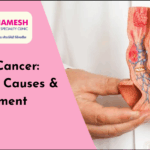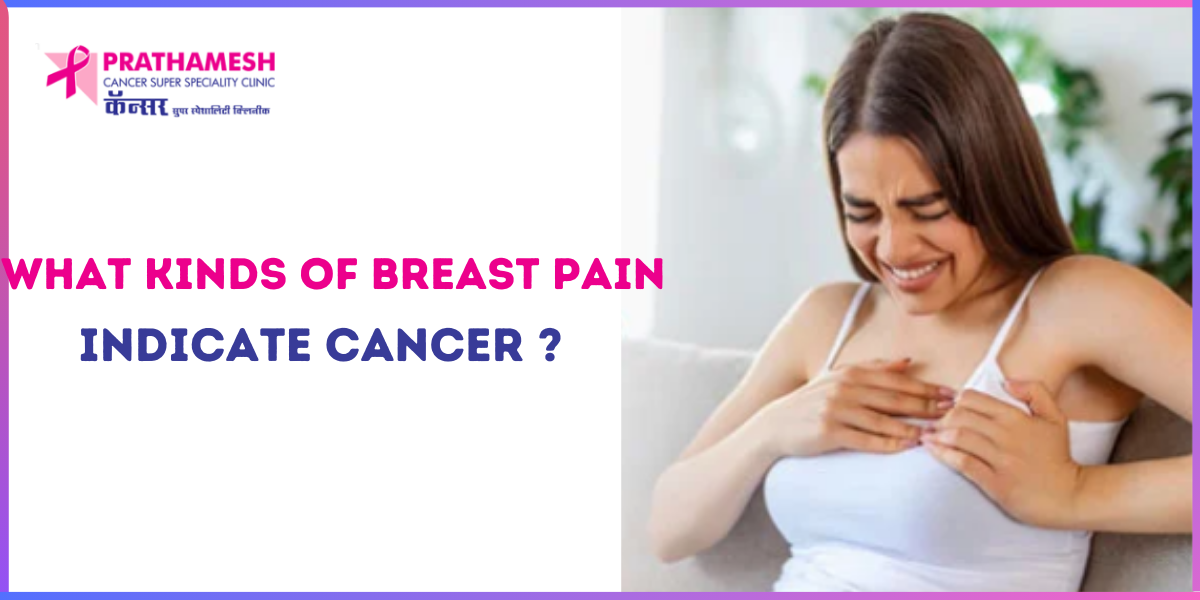Breast pain, also known as mastalgia, is a common concern among many women. While most cases of breast pain are not linked to breast cancer, it is essential to understand the types of breast pain that may indicate a potential issue that warrants further investigation. In this blog post, we will delve into the different types of breast pain and how they may be associated with breast cancer. Let’s explore the nuances of breast pain and its potential implications for your breast health. Discover the complexity of breast pain and its potential implications for your breast health with insights from Dr. Ashish Pokharkar the best breast cancer doctor in PCMC.
What kind of breast pain indicates cancer?
Kinds of Breast Pain That Could Indicate Cancer
Cyclic breast pain:
Tied to the menstrual cycle and hormonal fluctuations
Often feels dull, heavy, or achy
Accompanied by breast swelling, lumpiness, or fullness
It typically affects both breasts, especially the upper, outer areas
Peaks in the two weeks prior to menstruation, then subsides
Common in people in their 20s, 30s, and those transitioning to menopause
Noncyclic breast pain:
Not linked to the menstrual cycle
Described as tight, burning, stabbing, or aching
Can be constant or intermittent
It generally affects one localized area of the breast
More likely to occur in women after menopause
Understanding these distinctions can help in recognizing potential signs of concern for breast health.
Extramammary breast pain
Extramammary breast pain describes discomfort that feels like it originates in the breast tissue but actually begins outside of the breast area. It can result from various causes, such as strain in the chest muscles, leading to pain in the chest wall or rib cage that radiates to the breast. Another potential cause is costochondritis, an inflammation of the cartilage in the chest. Furthermore, extramammary breast pain can be attributed to conditions such as acid reflux, shingles, or nerve-related issues. Seeking professional medical advice is crucial for an accurate diagnosis and tailored treatment based on individual symptoms and medical history.
When should I see a doctor?
If you are experiencing breast pain that continues daily for more than a couple of weeks, occurs in one specific area of your breast, seems to be getting worse over time, interferes with your daily activities, or awakens you from sleep, it is advisable to make an appointment with your doctor for an evaluation. While the risk of breast cancer is low in individuals whose main symptom is breast pain, it’s crucial to heed your doctor’s recommendation for an evaluation and follow through with the suggested course of action.
Prevention
To prevent breast pain, consider the following steps:
Avoid hormone therapy when possible.
Steer clear of medications known to cause or exacerbate breast pain.
Wear a properly fitted bra and a sports bra during exercise to provide adequate support.
Consider relaxation therapy to manage anxiety associated with severe breast pain.
Limit or eliminate caffeine consumption, as some individuals find this dietary change helpful, despite inconclusive study results on caffeine’s effects on breast pain and premenstrual symptoms.
Avoid excessive or prolonged lifting activities.
Follow a low-fat diet and consume more complex carbohydrates.
If needed, consider using over-the-counter pain relievers like acetaminophen or ibuprofen, but consult your doctor regarding the appropriate dosage, as long-term use may pose risks of liver problems and other side effects.
It’s important to consult with a healthcare professional before making significant lifestyle or medication changes.
Conclusion:
Understanding the types of breast pain associated with breast cancer, such as cyclic and noncyclic pain, is crucial. Seeking medical advice for persistent symptoms is vital, considering extramammary causes. Consultation with a healthcare provider, along with lifestyle adjustments and proper breast health practices, can aid in managing and addressing breast pain effectively. Explore the expertise of the best breast cancer specialist in PCMC, for comprehensive care and guidance according to your unique needs.





